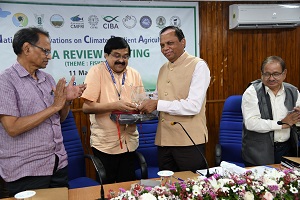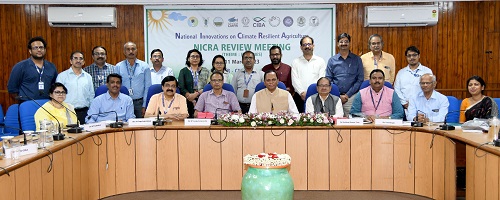11th March 2023, Kochi
The ICAR-Central Marine Fisheries Research Institute, Kochi hosted the review meeting of the research works of various fisheries research institutes and state agricultural universities under the fisheries component of the National Innovations in Climate Resilient Agriculture (NICRA) of ICAR today.


The meeting was chaired by Dr. S K Chaudhari, Deputy Director General (Natural Resources Management) emphasised the need for finding scientific solutions to the impacts of climate change on food-producing sectors, including fisheries. He exhorted that increase in temperature and heat waves are leading to disruption of groundwater behaviour posing threat to agriculture and allied sectors. He also said that assessing ecological losses is equally important while studying the impact of climate change on the food sector.
Dr B Venkateswarlu, Chairman, NICRA Expert Committee urged scientists to focus on technological innovations and contributions to policy interventions during the time of climate change. Innovative technologies would help fishermen to sustain their livelihood during cyclones, heavy rainfalls and other extreme weather conditions, he said.

Dr K K Vass, Member, NICRA Expert Committee said that there is a need for segregating the positive impacts of cyclones which supports the regional increase in production. The loss occurring in coastal communities like in the case of infrastructure damage and the loss in fishing days owing to extreme weather events such as storm-surge should be treated separately. In addition, studies on disruption of marine ecosystem services should also be carried out, Dr Vaas added.
Dr A Gopalakrishnan, Director, ICAR-CMFRI said the under the NICRA project the Institute has found India’s carbon emission from marine fisheries at the national level is lower than that of the global figure. The sector emits 1.32 t of CO2 (carbon dioxide) to produce one tonne of fish, much lower than the global figures of more than 2t of carbon emission per tonne of fish. Viewing that the NICRA project assumes significance as it helps to provide innovative solutions to a range of issues emanating from climate change, he further stated that the support of the project helped quicken the pace of ICAR-CMFRI’s research activities in India’s marine fisheries.
Principal Investigators of the NICRA project from ICAR-Central Marine Fisheries Research Institute (CMFRI), Kochi; ICAR-Central Institute of Brackishwater Aquaculture (CIBA), Chennai; ICAR-Central Inland Fisheries Research Institute (CIFRI), Barrackpore; ICAR-Directorate of Coldwater Fisheries Research (DCFR), Bhimtal; ICAR-National Bureau of Fish Genetic Resources (NBFGR), Lucknow; Tamil Nadu Dr J Jayalalithaa Fisheries University; and Bihar Animal Sciences University presented the status of their research works at the meeting.
ICAR-CMFRI’s presentation pointed out that increased intensity of cyclones, sea level rise, and warming of the Indian Ocean have led to changes in marine ecosystems among many others, causing depletion of some fishes and the emergence of some other varieties. The Institute identified cyclone proneness, flood proneness, shoreline changes, heat wave and sea level rise as the major hazards that make coastal lives in peril. Works on a Coastal Climate Risk Atlas that marks areas of risks including hazards and vulnerabilities in all coastal districts in India, are in progress.
Headed by DDG, ICAR, a team of experts including Dr B Venkateswarlu, Dr K K, Dr V K Singh, Director, Central Research Institute for Dryland Agriculture (CRIDA), and Dr M Prabhakar, Principal Investigator, NICRA, ICAR reviewed the research works.
(Source: ICAR-Central Marine Fisheries Research Institute, Kochi)








Like on Facebook
Subscribe on Youtube
Follow on X X
Like on instagram